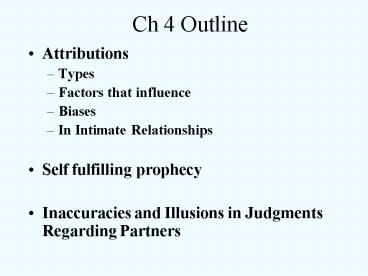Ch 4 Outline PowerPoint PPT Presentation
Title: Ch 4 Outline
1
Ch 4 Outline
- Attributions
- Types
- Factors that influence
- Biases
- In Intimate Relationships
- Self fulfilling prophecy
- Inaccuracies and Illusions in Judgments Regarding
Partners
2
Social Cognition
- Social psychology is the study of how people
influence our behavior - Social cognition focuses on the individual
patterns and biases in our perceptions about
peoples behavior
3
Attribution
- Defined-process we use to assign causes to
behavior (ours and others) - Function-We tend to explain and understand
behavior and the events that impact our lives
- Types Internal vs External
- Stable vs Temporary
4
Types of Attribution
Internal attributions based on individuals
dispositions, traits, abilities, and feelings
External attributions based on situational
variables that everyone is influenced by
5
Attributions Why is My Spouse Late?
Temporary
Stable
Internal
S/he is inconsiderate
S/he is tired
Her/His boss often asks her/him to do something
at quitting time
Car trouble
External
6
How do we decide whether behavior is due to
internal or external causes?
- Consistency how the persons behavior varies
over time in same setting (Is s/he late for
family dinner often?)
- Consensus how the persons behavior compares
with others behavior in same setting (Are others
late for family dinner?)
- Distinctiveness how the persons behavior
varies across settings (Is s/he late often for
other activities?)
7
When do we spend a lot of time thinking about
attributions?
- When someones behavior affects us, especially if
the effect is negative (Weiner, 1985)
8
Biases in Attribution
- Fundamental Attribution Error we tend to make
internal attributions for others behavior (He
was late because he is lazy or tired.)
- Actor-Observer Bias we tend to make external
attributions for our behavior (He was late
because he is lazy, BUT I was late because my
alarm didnt go off.)
9
Biases in Attribution
- Self-Serving Bias we tend to attribute our
success to internal factors and failure to
external factors (I got an A in Psy because I am
smart, I got a D in Math because the tests were
unfair.)
10
Contextual Model of Attribution
Partner As behavior
Partner Bs processing
Partner Bs behavior
Partner As processing
11
Attribution Processing in Intimate Relationships
(Holtzworth-Munroe Jacobsen, 1985)
- Women spend more time processing attributions
than men, regardless of how happy they are in the
relationship - Men in happy relationships invest much less time
processing attributions than men in unhappy
relationships
12
Attribution Processing in Intimate Relationships
(Holtzworth-Munroe Jacobsen, 1985 Brehm
Kassin, 1990)
13
Contextual Model of Attribution
Partner As behavior
Partner Bs processing
Good or Bad Deed
External/Internal Temp/Stable
Partner Bs behavior
Partner As processing
14
Attributions Affect Behavior (Bradbury Fincham,
1992)
- Distress-maintaining attributions predict less
effective conflict resolution behavior (high
rates of hostile and rejecting behavior) - Distress-maintaining attributions make one likely
to - Reciprocate partners negative behavior
- Fail to respond to partners positive behavior
15
Contextual Model of Attribution
Partner As behavior
Partner Bs processing
Partner Bs behavior
Partner As processing
16
Attachment as Context Variable
- Securely attached people more likely to make
relationship-maintaining attributions - Remember positive past events
- Open to new information
- Accurate judges of partners thoughts feelings
- Insecurely attached people more likely to make
distress-maintaining attributions
17
Schemas as Context Variables
- We all have a relationship schema or set of
beliefs and expectations about how a relationship
should be - Romantic beliefs predict love, but not
relationship success (Sprecher Metts, 1989) - Each of us has only one true love
- Dysfunctional beliefs predict dissatisfaction and
dissolution in intimate relationships (Eidelson
Epstein, 1981, 1982) - Disagreements are destructive
18
Attribution in Family
- Consensual validity-unified consensus information
(you are the only one here acting differently)
of family members about 1 member is powerful
influence on self-concept - Can lead to scapegoating-one member is alienated
and blamed for all familys problems, no one is
there to contradict - Can lead to gaslighting-members consistently call
into question 1 members perception of self and
reality
19
Self-fulfilling Prophecies
- We follow cues about how we are expected to act
20
Self-fulfilling Prophecies
- Men expected to talk to hot babe or plain
Jane, treated women accordingly
- Low self-esteem people elicit rejection
21
Attributions become Self-fulfilling Prophecies
- In close relationships, we maintain our reps
- Unhappy relationship over time Good deeds
decrease and bad deeds increase (She never
notices when Im on time so why should I
hurry?!) - Happy relationship over time Good deeds
increase and bad deeds decrease (He thinks Im a
great cook so Ill make my special lasagna
tonight!)
22
How Accurately Do We Know Our Partners?
- We overestimate how similar we are to our
partners - Especially anxiously attached
- We overestimate how well our partners understand
us and agree with us - Perceived similarity associated with relationship
satisfaction
23
What Factors Affect Accuracy?
- Type of relationship
- Living together leads to greater accuracy than
length of acquaintance - Married people are more accurate than daters and
friends - Newlyweds more accurately infer partners
thoughts than oldyweds
24
What Factors Affect Accuracy?
- Perceiver traits
- Intelligence and open-mindedness predict accuracy
- Secure attachment predicts accuracy
25
Positive Illusions in Intimate Relationships
- We judge partners in idealized way
- We emphasize positive traits
- If we are aware of faults, we perceive them as
less important than others do - Relationships with positive illusions associated
with greater satisfaction, love, and trust
26
Why are we the most knowledgeable but least
objective
- Ideals become mixed up with reality
- Illusions make us feel better about ourselves
- Illusions maintain commitment

